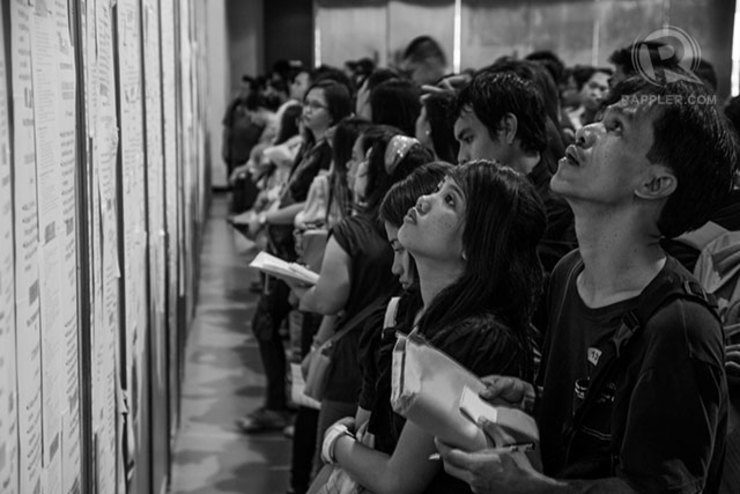SUMMARY
This is AI generated summarization, which may have errors. For context, always refer to the full article.

MANILA, Philippines (UPDATED) – A wage hike of P15 for Metro Manila’s minimum wage earners was approved by the regional wage board.
Starting April 15, the region’s workers in the non-agricultural sector will receive a minimum wage of P481, while workers in the agricultural sector will have a minimum wage of P444.
Department of Labor and Employment communications director Nicon Fameronag announced the news on Wednesday, March 18, at the DOLE office in Manila.
The hike is set to benefit 587,000 workers, said Labor Secretary Rosalinda Baldoz, who also chairs the National Wages and Productivity Commission.
For workers who receive their salaries twice a month every 15 days, the increase will reflect in their April 30 pay slips.
The Regional Tripartite Wages and Productivity Board-National Capital Region (RTWPB-NCR) approved the resolution on the P15 increase, which is on top of the P15 Cost of Living Allowance in effect since January 2014.
DOLE NCR Director Alex Avila explained that the hike is consistent with government policy that takes into account workers’ and their families’ needs, as well as business stability.
“The take-home pay of our minimum wage earners will increase to P492.57 per day, or by 3.2%, because of the wage hike, compared to the current P477.03 per day. They will also enjoy a higher 13th month pay and increased social security coverage,” Avila said.
A workers’ take-home pay includes the amount he will get from the law-mandated 13th month pay.
Avila explained that minimum wage earners are exempt from paying income tax on their wage. No taxes are imposed on their hazard pay, holiday pay, night shift differential, and overtime pay either.
He added that NCR businesses will be able to bear the cost and still sustain employment creation.
The P15 increase is the 5th wage increase since President Benigno Aquino III took office in 2010.
Calls for across-the-board increase
In a phone interview with Rappler, Fameronag explained that two wage hike petitions were filed before the RTWPB-NCR, asking for an across-the-board wage increase.
This, however, is not within the regional wage board’s mandate.
“Unfortunately, the RTWPB is not mandated to set across-the-board wage increases. Our mandate is to set minimum wages,” the board said in a resolution.
The board asked petitioners to conform with standards prescribed by law in petitions that will be filed in the future.
Trade Union Congress of the Philippines-Nagkaisa’s Alan Tanjusay, however, asked the regional wage board to “show the formula they used as basis for the new wage order and subject it to healthy discussion.”
“They better explain it to the workers immediately or else their lack of credibility may invite confusion, if not incite chaos, particularly among poor workers,” he said, calling the P15 increase “revolting.”
TUCP was among the petitioners before the RTWPB.
On the other hand, Kilusang Mayo Uno chair Elmer Labog said such “region-based wage hikes don’t address the attacks carried out against the minimum wage in the country for decades.”
“We are fighting for the implementation of a National Minimum Wage in the amount of P16,000 monthly to give workers some immediate relief and to turn back the attacks against the minimum wage throughout the country,” Labog said.
He added that the wage hike is insufficient, considering increases in the prices of basic commodities and the fare hike in Metro Manila trains.
‘Let market forces decide’
Reacting to the wage hike, lawyer Noel Balsicas of the People Management Association of the Philippines said the mandated minimum wage is an outmoded means of wage determination.
“This will have an effect on other personnel who are not directly affected by the increase through wage compression or wage distortion,” he said.
Employers are now forced to increase the salary of a worker with a typically higher rate than a minimum wage earner to “restore the seniority of that individual.”
Balsicas said it is better to let market forces decide salary increases instead of the government mandating them.
“It also backfires in a way to the workers,” he added, explaining that manufacturers are now forced to increase the price of their products and services to sustain the higher salaries of their workers.
This creates an “additional pressure on the cost of living,” he said, calling it a “chicken-and-egg situation.”
Around 40% of manufacturing cost is labor, he added. – Rappler.com
Add a comment
How does this make you feel?





There are no comments yet. Add your comment to start the conversation.